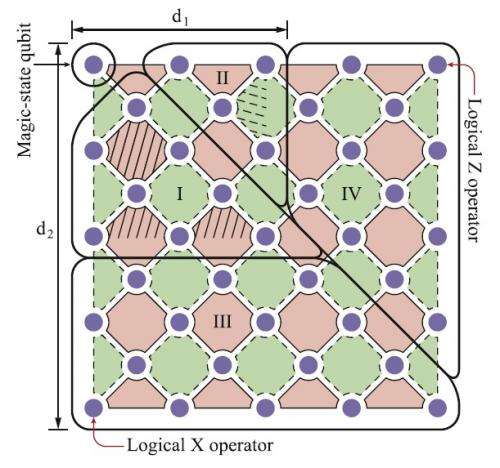March 13, 2015 feature
Magic states offer surprisingly low error rates for quantum computing

(Phys.org)—Quantum computers hold a special allure, as they offer a way to harness quantum phenomena and put it to use to do things that are impossible for ordinary computers. But as powerful as quantum computers could be, they are also delicate in a way, since they must be shielded from the "noise" in the environment that causes detrimental errors. Making quantum computers that are noise-resistant, or fault-tolerant, is one of the biggest challenges facing their development.
Currently, the leading approach to fault-tolerant quantum computing involves "magic states." First proposed in 2005 by Sergey Bravyi and Alexei Kitaev, magic states are quantum states that contain an acceptably low level of error. In order to create magic states, physicists take noisy quantum states and use a process called distillation to derive a smaller number of improved, i.e., higher fidelity, states. This process is repeated as many times as necessary until the states reach the target fidelity.
Although distillation works, it is a resource-intensive process that requires the majority of a quantum computer's hardware. In some cases, up to 90% of a quantum computer's qubits are needed to create magic states, before any real computing can be done.
To address this problem, Ying Li, a physicist at the University of Oxford, has looked for a way to minimize the noise in raw magic states (before any distillation) in order to reduce the number of distillation steps required, and in turn reduce the resource cost. In his work, he made a surprising discovery: raw magic states can have a fidelity that is superior to that of the operations that created them.
Li's protocol takes advantage of the fact that qubits are more sensitive to noise when the code distance (which is related to the number of qubits in a row of a lattice) is small, and more stable when the code distance is larger. After an initial encoding step, the protocol enlarges the code distance in order to reduce the error rate.
Even though a large number of operations are required to create a single magic state, Li showed that the infidelity of a raw magic state created by the new method is less than half the infidelity of even a single quantum gate used to create it.
The new method could lead to significant advantages for fault-tolerant quantum computing. For one type of magic state, for example, the new protocol can reduce the error due to noise by more than 20 times compared to previous protocols. As a result, the number of raw magic states required can then be reduced by a factor of 15. This improvement translates to fewer distillation steps and a dramatic reduction in the hardware needed for quantum computing tasks.
More information: Ying Li. "A magic state's fidelity can be superior to the operations that created it." New Journal of Physics. DOI: 10.1088/1367-2630/17/2/023037
Journal information: New Journal of Physics
© 2015 Phys.org



















